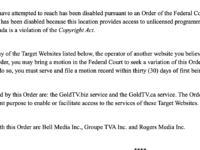Last week I wrote about a federal court ruling that opened the door to copyright website blocking in Canada without Parliament establishing site blocking rules or the involvement of the CRTC. The decision is flawed from both a policy and legal perspective, substituting the views of one judge over Parliament’s judgment and relying on a foreign copyright case that was rendered under markedly different legal rules than those found in Canada. I concluded by noting that the case should be appealed and just over a week later, TekSavvy, the independent ISP that stood alone in contesting the blocking order, did just that. Even as the appeal was launched, however, the major Canadian ISPs began blocking access to the specific webpages identified in the court order.
Archive for November 26th, 2019

Law Bytes
Episode 256: Jennifer Quaid on Taking On Big Tech With the Competition Act's Private Right of Access
byMichael Geist

Episode 256: Jennifer Quaid on Taking On Big Tech With the Competition Act's Private Right of Access
February 2, 2026
Michael Geist
The Law Bytes Podcast, Episode 255: Grappling with Grok – Heidi Tworek on the Limits of Canadian Law
January 26, 2026
Michael Geist
December 22, 2025
Michael Geist
December 8, 2025
Michael Geist
December 1, 2025
Michael Geist
Search Results placeholder
Recent Posts
 An Illusion of Consensus: What the Government Isn’t Saying About the Results of its AI Consultation
An Illusion of Consensus: What the Government Isn’t Saying About the Results of its AI Consultation  The Law Bytes Podcast, Episode 256: Jennifer Quaid on Taking On Big Tech With the Competition Act’s Private Right of Access
The Law Bytes Podcast, Episode 256: Jennifer Quaid on Taking On Big Tech With the Competition Act’s Private Right of Access  Government Says There Are No Plans for National Digital ID To Access Services
Government Says There Are No Plans for National Digital ID To Access Services  Government Reveals Digital Policy Priorities in Trio of Responses to Canadian Heritage Committee Reports
Government Reveals Digital Policy Priorities in Trio of Responses to Canadian Heritage Committee Reports  The Law Bytes Podcast, Episode 255: Grappling with Grok – Heidi Tworek on the Limits of Canadian Law
The Law Bytes Podcast, Episode 255: Grappling with Grok – Heidi Tworek on the Limits of Canadian Law

